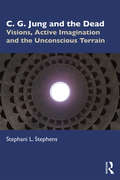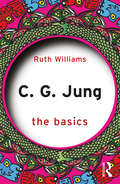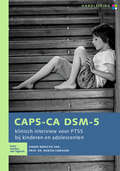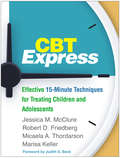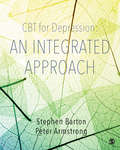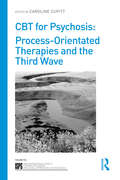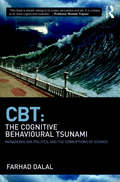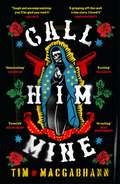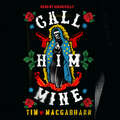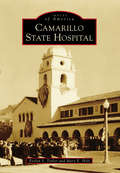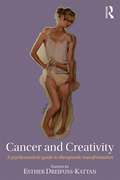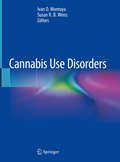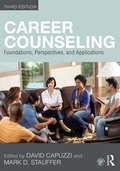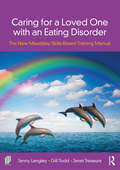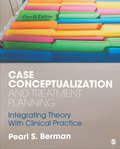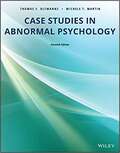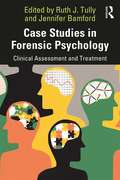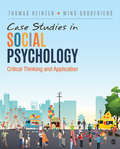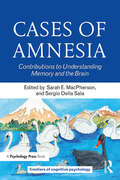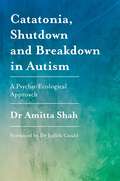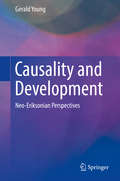- Table View
- List View
C. G. Jung and the Dead: Visions, Active Imagination and the Unconscious Terrain
by Stephani L. StephensC. G. Jung and the Dead: Visions, Active Imagination and the Unconscious Terrain offers an in-depth look at Jung’s encounters with the dead, moving beyond a symbolic understanding to consider these figures a literal presence in the psyche. Stephani L. Stephens explores Jung’s personal experiences, demonstrating his skill at visioning in all its forms as well as detailing the nature of the dead. This unique study is the first to follow the narrative thread of the dead from Memories, Dreams, Reflections into The Red Book, assessing Jung’s thoughts on their presence, his obligations to them, and their role in his psychological model. It offers the opportunity to examine this previously neglected theme unfolding during Jung’s period of intense confrontation with the unconscious, and to understand active imagination as Jung’s principle method of managing that unconscious content. As well as detailed analysis of Jung’s own work, the book includes a timeline of key events and case material. C. G. Jung and the Dead will offer academics and students of Jungian and post-Jungian studies, the history of psychology, Western esoteric history and gnostic and visionary traditions a new perspective on Jung’s work. It will also be of great interest to Jungian analysts and psychotherapists, analytical psychologists and practitioners of other psychological disciplines interested in Jungian ideas.
C. G. Jung: The Basics (The Basics)
by Ruth WilliamsC. G. Jung: The Basics is an accessible, concise introduction to the life and ideas of C. G. Jung for readers of all backgrounds, from those new to Jung’s work to those looking for a convenient reference. Ruth Williams eloquently and succinctly introduces the key concepts of Jungian theory and paints his biographical picture with clarity. The book begins with an overview of Jung’s family life, childhood, and relationship with (and subsequent split from) Sigmund Freud. Williams then progresses thematically through the key concepts in his work, clearly explaining ideas including the unconscious, the structure of the psyche, archetypes, individuation, psychological types and alchemy. C. G. Jung: The Basics also presents Jung’s theories on dreams and the self, and explains how his ideas developed and how they can be applied to everyday life. The book also discusses some of the negative claims made about Jung, especially his ideas on politics, race, and gender, and includes detailed explanations and examples throughout, including a chronology of Jung’s life and suggested further reading. C. G. Jung: The Basics will be key reading for students at all levels coming to Jung’s ideas for the first time and general readers with an interest in his work. For those already familiar with Jungian concepts, it will provide a helpful guide to applying these ideas to the real world.
CAPS-CA DSM-5 – handleiding: Klinisch interview voor PTSS bij kinderen en adolescenten
by Ramón LindauerDoel van de testDe CAPS-CA 5 is een semigestructureerd interview voor het diagnosticeren van post-traumatische stressstoornis (PTSS) en acute stressstoornis bij kinderen en adolescenten volgens de criteria van de DSM 5. Onbehandelde PTSS heeft bij kinderen en adolescenten een ernstige negatieve invloed op de ontwikkeling en het psychosociaal functioneren, terwijl evidence-based traumabehandelingen beschikbaar zijn. Signalering van traumagerelateerde klachten is dan ook van belang om ernstige problemen op het gebied van de psychosociale ontwikkeling te voorkomen. Toepassing• Individuele diagnostiek: stelt de aanwezigheid van PTSS en acute stressstoornis vast volgens de DSM 5. Stelt de impact vast van de aanwezige symptomen op het psychosociaal functioneren.• Evaluatie: meet het effect van (evidence-based) traumabehandeling.Wat meet de CAPS-CA 5?De CAPS-CA 5 meet de frequentie en de intensiteit van symptomen die samenhangen met de DSM 5 PTSS-kenmerken en stelt daarnaast vast wat de impact van deze symptomen is. Voor wie?De CAPS-CA 5 wordt afgenomen door psychologen, orthopedagogen en kinder- en jeugdpsychiaters. Afname en scoringDe CAPS-CA 5 wordt individueel bij kinderen afgenomen. De duur van het interview is ca. 45-60 minuten (afhankelijk van de leeftijd van het kind, en de ernst en type van het trauma). Hulpmiddelen bij de afnameEr zijn hulpmiddelen die men kan gebruiken bij de afname van de CAPS-CA 5: een kalender, een intensiteitsblad en een frequentieblad. Deze hulpmiddelen zijn gratis downloadbaar via de BSL site en te vinden op de pagina van de complete set van de CAPS-CA 5. Het intensiteitsblad en frequentieblad zijn ook als herbruikbare plastic kaart opgenomen in de complete set. NormenDe CAPS-CA 5 wordt vooralsnog gebruikt met de valideringsgegevens van de vorige editie van de CAPS-CA uit 2014 die werd onderzocht met een groep kinderen die één of meer traumatische gebeurtenissen meemaakten en met kinderen die stressvolle gebeurtenissen meemaakten die niet aan het A-criterium voldeden. Deze valideringsgegevens zijn al bijlag opgenomen in de handleiding van de CAPS-CA 5. Materiaal• Complete set (handleiding, set interviewboekjes, frequentiekaart en intensiteitskaart)• Interviewboekjes (set van 10 stuks)
CBT Express: Effective 15-Minute Techniques for Treating Children and Adolescents
by Robert D. Friedberg Jessica M. McClure Micaela A. Thordarson Marisa KellerOffering vital tools for working with 4- to 18-year-olds in a wide range of settings, this book presents engaging cognitive-behavioral therapy (CBT) activities that can be implemented rapidly and flexibly. Concise chapters guide the provider to quickly identify meaningful points of intervention for frequently encountered clinical concerns, and to teach and model effective strategies. Each intervention includes a summary of the target age, module, purpose, rationale, materials needed, and expected time for completion, as well as clear instructions and sample dialogues and scripts. In a convenient large-size format, the book features helpful graphics and 77 reproducible handouts and worksheets in the form of Handy and Quick (HQ) Cards. Purchasers get access to a Web page where they can download and print the reproducible materials.
CBT for Depression: An Integrated Approach
by Peter Armstrong Dr Stephen BartonThis book introduces an approach to CBT for depression that integrates cognitive-behavioural models, evidence and therapies. Rooted in evidence-based practice and practically focused, it draws on components of first, second and third-wave CBT to help readers tailor therapy to the needs of individual clients. There is a particular focus on challenging presentations: the authors equip students with the skills to work with different depression sub-types, co-morbid disorders and a broad range of bio-psychosocial factors that can complicate depression and its therapy. Linking theory, evidence and case illustrations, the authors provide a wealth of practical tips that support clinical practice. In-depth cases studies and client contributions add further depth to this rich and stimulating book. This book is relevant to those taking postgraduate training courses in mental health such as CBT therapists, counsellors, nurses, clinical psychologists, occupational therapists, social workers and psychiatrists.
CBT for Depression: An Integrated Approach
by Peter Armstrong Dr Stephen BartonThis book introduces an approach to CBT for depression that integrates cognitive-behavioural models, evidence and therapies. Rooted in evidence-based practice and practically focused, it draws on components of first, second and third-wave CBT to help readers tailor therapy to the needs of individual clients. There is a particular focus on challenging presentations: the authors equip students with the skills to work with different depression sub-types, co-morbid disorders and a broad range of bio-psychosocial factors that can complicate depression and its therapy. Linking theory, evidence and case illustrations, the authors provide a wealth of practical tips that support clinical practice. In-depth cases studies and client contributions add further depth to this rich and stimulating book. This book is relevant to those taking postgraduate training courses in mental health such as CBT therapists, counsellors, nurses, clinical psychologists, occupational therapists, social workers and psychiatrists.
CBT for Psychosis: Process-orientated Therapies and the Third Wave (The International Society for Psychological and Social Approaches to Psychosis Book Series)
by Caroline CupittCognitive Behaviour Therapy (CBT) for psychosis is constantly changing and evolving. Recently, in what is sometimes called the ‘third wave’, therapy has become more concerned with the individual’s relationship to their experience, rather than with the content of it. This more process–orientated approach appears to tap into universal psychological processes. The aim is to reduce distress by changing the function of the experience, rather than necessarily the experience itself. Written by some of the leading figures from around the world, CBT for Psychosis: Process-Orientated Therapies and the Third Wave brings the reader the latest developments in the field. Presented in three parts, CBT for Psychosis first explores theoretical perspectives on recent developments in cognitive behavioural therapies. Part two examines specific therapeutic approaches, including metacognitive training, mindfulness, acceptance and commitment therapy, compassion focused therapy and the method of levels. Finally, part three presents two critical perspectives: the first offering a reflection on the experience of receiving CBT, and the second looking ahead to possible future developments. Offering a cutting-edge collection of theoretical, therapeutic and critical perspectives, CBT for Psychosis: Process-Orientated Therapies and the Third Wave will be of great interest to clinical and counselling psychologists, both practising and in training, as well as psychiatrists, nurse therapists, occupational therapists and other healthcare professionals working with people experiencing psychosis.
CBT: Managerialism, Politics and the Corruptions of Science
by Farhad DalalIs CBT all it claims to be? The Cognitive Behavioural Tsunami: Managerialism, Politics, and the Corruptions of Science provides a powerful critique of CBT’s understanding of human suffering, as well as the apparent scientific basis underlying it. The book argues that CBT psychology has fetishized measurement to such a degree that it has come to believe that only the countable counts. It suggests that the so-called science of CBT is not just "bad science" but "corrupt science". The rise of CBT has been fostered by neoliberalism and the phenomenon of New Public Management. The book not only critiques the science, psychology and philosophy of CBT, but also challenges the managerialist mentality and its hyper-rational understanding of "efficiency", both of which are commonplace in organizational life today. The book suggests that these are perverse forms of thought, which have been institutionalised by NICE and IAPT and used by them to generate narratives of CBT’s prowess. It claims that CBT is an exercise in symptom reduction which vastly exaggerates the degree to which symptoms are reduced, the durability of the improvement, as well as the numbers of people it helps. Arguing that CBT is neither the cure nor the scientific treatment it claims to be, the book also serves as a broader cultural critique of the times we live in; a critique which draws on philosophy and politics, on economics and psychology, on sociology and history, and ultimately, on the idea of science itself. It will be of immense interest to psychotherapists, policymakers and those concerned about the excesses of managerialism.
Call Him Mine: A Telegraph Thriller of the Year
by Tim MacGabhannA TELEGRAPH THRILLER OF THE YEAR 'A wild ride' Ian Rankin'Tough and uncompromising: you'll be glad you read it' Lee Child'Hilarious, gripping, poetic. I loved it' Adrian McKinty, author of The Chain 'Gripping from beginning to end' Independent'Intoxicating and chilling' Observer 'Pacy and exciting' Daily Telegraph'Vivid and lyrical' Guardian'MacGabhann paints an extraordinarily vivid picture of Mexico, in all its seething, sweltering madness and beauty' Irish Independent Nobody asked us to look.Every day, every since, I still wish we hadn't. Jaded reporter Andrew and his photographer boyfriend, Carlos, are sick of sifting the dregs of Mexico's drug war: from cartel massacres to corrupt politicians, they think they've seen it all.But when they find a body even the police are too scared to look at, what started out as just another assignment becomes the sort of story all reporters dream of... ...until Carlos pushes for answers too fast, and winds up murdered, leaving Andrew grief-stricken and flailing for answers, justice, and revenge.
Call Him Mine: A Telegraph Thriller of the Year
by Tim MacGabhannA TELEGRAPH THRILLER OF THE YEAR'A wild ride' Ian Rankin'Tough and uncompromising: you'll be glad you read it' Lee Child'Hilarious, gripping, poetic. I loved it' Adrian McKinty, author of The Chain'Gripping from beginning to end' Independent'Intoxicating and chilling' Observer'Pacy and exciting' Daily Telegraph'Vivid and lyrical' Guardian'MacGabhann paints an extraordinarily vivid picture of Mexico, in all its seething, sweltering madness and beauty' Irish IndependentNobody asked us to look.Every day, every since, I still wish we hadn't.Jaded reporter Andrew and his photographer boyfriend, Carlos, are sick of sifting the dregs of Mexico's drug war: from cartel massacres to corrupt politicians, they think they've seen it all.But when they find a body even the police are too scared to look at, what started out as just another assignment becomes the sort of story all reporters dream of... ...until Carlos pushes for answers too fast, and winds up murdered, leaving Andrew grief-stricken and flailing for answers, justice, and revenge.
Call Him Mine: A Telegraph Thriller of the Year
by Tim MacGabhannJaded reporter Andrew and his photographer boyfriend, Carlos, are sick of telling just another story. From cartel massacres to corrupt politicians, sifting the dregs of Mexico's drug war, they think they've seen it all. But when they find a body even the police are too scared to look at, what started out as just another reportage becomes the sort of story all reporters dream of.Until Carlos pushes for answers too fast, and winds up murdered, leaving Andrew grief-stricken and flailing for answers, justice, and revenge. Caught in a web of dirty money that stretches from the boardrooms of the United States to the death squads of El Salvador, Andrew must decide whether to save himself - or find out who killed the man he loves, and destroyed the only home he's ever known.(p) Orion Publishing Group Ltd 2019
Camarillo State Hospital (Images of America)
by Evelyn S. Taylor Mary E. HoltCamarillo State Hospital, affectionately known as "Cam," officially opened its doors in 1936, during a time when the California State Commission in Lunacy oversaw the treatment and care of those deemed mentally ill. A pioneering research institution in autism and schizophrenia, Cam achieved notoriety as one of two state institutions that accommodated children and as the first state hospital to receive certification for treatment of the developmentally disabled. Although it was an independent body, retaining its own dairy, farm, residences, and even a bowling alley, Cam also developed creative relationships with volunteers, educators, and businesspeople for the betterment of its patients. "Enhancing Innovation Through Independence" became Cam's final ambition and, in the end, its ultimate achievement.
Cancer and Creativity: A Psychoanalytic Guide to Therapeutic Transformation
by Esther Dreifuss-KattanCancer and Creativity is a dialogue between accounts by cancer patients and survivors and a more clinical consideration and theoretical discussion from a psychoanalytic point of view of using creativity in coping with serious illness. The contributions featured demonstrate the power of creative expression as a tool for dealing with somatic, chronic and potentially life-threatening illnesses, giving patients a way of expressing and managing their individual cancer journeys and its attendant emotional sequelae. Ten artist-patients and survivors, who were involved in several long-term art therapy groups, give accounts of their experiences with cancer and with their support group, where they create paintings, embroidery, digital photography, comic books, maps and other works to express their experiences of being diagnosed and treated for cancer. The contributors describe their symptoms and their relationships to physicians and family members in words and visual representations. The book also addresses the experience of the public when they are confronted with art by cancer patients. Dreifuss-Kattan's own work as a psychoanalyst and art therapist informs her approach to the art space as what Winnicott calls a "transitional space," influenced by both the personal psychological experience and the physical environment. Dreifuss-Kattan closes her discussion with a reflection on terminal cancer care and the complex transferential and countertransferential relationship between patient and therapist. The book ends with a practical guide for both therapy groups, as well as individuals at home, to creatively address their experiences with cancer and its treatments. Cancer and Creativity will be of great interest to psychoanalysts, psychoanalytic psychotherapists, psychooncologists and art therapists, as well as health professionals working in oncology and in palliative care.
Cannabis Use Disorders
by Ivan D. Montoya Susan R. WeissThis book is an unbiased scientific compendium documenting the state-of-the-art in the etiology, diagnosis and treatment of Cannabis Use Disorders (CUD). Unlike any other current medical text, this volume focuses on the scientific aspects of CUDs and provides a resource for researchers, physicians and other health care providers who treat patients suffering from the disorder or its consequences. It begins by establishing the landscape of the disorder, including its prevalence, association with disabilities and comorbidities, and frequency of patients seeking treatment. The text delves into the complexity of the disorder in today’s environment by including the discoveries on the nature and extent of the endocannabinoid system as well as potential breakthroughs in safe and effective pharmacological and nonpharmacological treatments. Experts in the field contribute discussions on the most cutting-edge diagnostic and biological topics, including genetics, medical consequences, and clinical manifestations. The text also covers the challenges and risks presented by external factors, including social repercussions, protective factors, psychiatric comorbidities, withdrawal, and treatment services. Cannabis Use Disorders is a vital resource for researchers, psychiatrists, psychologists, addiction medicine specialists, toxicologists, hospital administrators, nurses, social workers, and all health care professionals working with patients who misuse cannabis.
Career Counseling: Foundations, Perspectives, and Applications
by David Capuzzi Mark D. StaufferCareer Counseling, 3rd edition, provides a comprehensive, holistic overview of the foundations of career counseling, information on the most effective skills and techniques, and contextual perspectives on career and lifestyle planning, all by nationally and internationally recognized experts. Updated chapters introduce important material not often addressed in introductory texts, such as rehabilitation, addictive behaviors, counseling couples and families, and working with ethnic and gender/sexual minority clients. Included throughout the text are case studies, informational sidebars, and experiential activities that enhance the reading and encourage additional contemplation of chapter content. Readers can also turn to the book’s companion website for chapter test questions, PowerPoints, and additional resources.
Caring for a Loved One with an Eating Disorder: The New Maudsley Skills-Based Training Manual
by Janet Treasure Jenny Langley Gill ToddCaring for a Loved One with an Eating Disorder: The New Maudsley Skills-Based Training Manual provides a framework for carer skills workshops which can be used by anyone working with these conditions. Based on the successful New Maudsley Model, which equips carers with the knowledge and skills needed to support those with an eating disorder, the book consists of two sections which will help facilitators to deliver skills workshops to carers. The first section provides the theoretical background, while the second uses exercises to bring the New Maudsley Model to life. The skills workshops provide a much-needed lifeline, giving carers an opportunity to meet in a safe, non-judgemental and confidential environment, and to learn to recognise that changes in their own responses can be highly beneficial. With session-by-session guidelines and handouts for participants, Caring for a Loved One with an Eating Disorder: The New Maudsley Skills-Based Training Manual will be of aid to anyone working with someone coping with these conditions.
Case Conceptualization and Treatment Planning: Integrating Theory With Clinical Practice
by Dr Pearl Susan BermanCase Conceptualization and Treatment Planning: Integrating Theory With Clinical Practice teaches students in counseling, psychotherapy, and clinical psychology how to develop the case conceptualization and treatment planning skills necessary to help clients achieve change. Author Pearl S. Berman provides client interviews and sample case studies in each chapter along with detailed steps for practice and developing treatment plans. Chapters conclude with questions that engage students in critical thinking about the complexity of human experiences. The updated and expanded Fourth Edition includes cutting-edge issues in trauma-informed care; responsiveness to development across the lifespan; integration of issues relevant to intersectionality of oppression; and evidence-based practice.
Case Conceptualization and Treatment Planning: Integrating Theory With Clinical Practice
by Dr Pearl Susan BermanCase Conceptualization and Treatment Planning: Integrating Theory With Clinical Practice teaches students in counseling, psychotherapy, and clinical psychology how to develop the case conceptualization and treatment planning skills necessary to help clients achieve change. Author Pearl S. Berman provides client interviews and sample case studies in each chapter along with detailed steps for practice and developing treatment plans. Chapters conclude with questions that engage students in critical thinking about the complexity of human experiences. The updated and expanded Fourth Edition includes cutting-edge issues in trauma-informed care; responsiveness to development across the lifespan; integration of issues relevant to intersectionality of oppression; and evidence-based practice.
Case Studies In Abnormal Psychology
by Thomas F. Oltmanns Michele T. MartinCase Studies in Abnormal Psychology presents actual clinical cases, providing developmental histories essential to appropriate diagnosis and treatment of mental disorders. This text presents 23 distinct case studies, applying abstract theoretical research to real-world situations. Each study describes the clinical problem, demonstrates the formulation and implementation of a treatment plan, and discusses evidence of potential causes and prevalence. This comprehensive examination includes cases ranging from psychotic and personality disorders including schizophrenia and bipolar disorder to those concerning child development and aging such as attention-deficit and hyperactivity disorder. Coverage of sometimes controversial subjects including dissociative identity disorder, gender dysphoria, autism spectrum disorder, and posttraumatic stress disorder ensures contemporary relevance.
Case Studies in Forensic Psychology: Clinical Assessment and Treatment
by Ruth Tully Jennifer BamfordCase Studies in Forensic Psychology offers the reader a unique insight into the often-hidden world of psychological assessment and intervention with people who have committed serious crimes. The book contains a breadth of forensic case studies, and each chapter details the real forensic work that psychologists do in their clinical practice in prison, psychiatric, and community settings. Assessment and therapeutic approaches used in each case study are discussed, as well as the state of the literature in each area (e.g. sexual violence risk assessment, schema therapy). Each chapter will take the reader through a variety of offender profiles, their personal background, any relevant psychiatric or psychological diagnoses, and assessments and/or treatment completed. Case studies offer valuable insight into the clinical practice and day-to-day role of a forensic psychologist, demonstrating the work undertaken that empirical research does not offer. Uniquely, Case Studies in Forensic Psychology brings together treatment models and forensic research, demonstrating how theory translates into practice and considering whether it is effective at an individual level. It is ideal for students of forensic psychology and forensic mental health, as well as practitioners at any stage of their career in this rapidly expanding field.
Case Studies in Social Psychology: Critical Thinking and Application
by Dr Thomas Heinzen Dr Wind GoodfriendIn Case Studies in Social Psychology: Critical Thinking and Application, Thomas Heinzen and Wind Goodfriend use brief, entertaining case stories to illustrate the historical context and evolution of major theories within the field of social psychology. By employing a unique mix of contemporary research and hallmark studies, Heinzen and Goodfriend encourage students to explore new, meaningful ways of thinking about and connecting with foundational course concepts. In turn, this approach facilitates engaged conversation and deeper critical thinking both in and out of the classroom.
Case Studies in Social Psychology: Critical Thinking and Application
by Dr Thomas Heinzen Dr Wind GoodfriendIn Case Studies in Social Psychology: Critical Thinking and Application, Thomas Heinzen and Wind Goodfriend use brief, entertaining case stories to illustrate the historical context and evolution of major theories within the field of social psychology. By employing a unique mix of contemporary research and hallmark studies, Heinzen and Goodfriend encourage students to explore new, meaningful ways of thinking about and connecting with foundational course concepts. In turn, this approach facilitates engaged conversation and deeper critical thinking both in and out of the classroom.
Cases of Amnesia: Contributions to Understanding Memory and the Brain (Frontiers of Cognitive Psychology)
by Sergio Della Sala Sarah E. MacPhersonIn all cognitive domains, neuropsychological research has advanced through the study of individual patients, and detailed observations and descriptions of their cases have been the backbone of medical and scientific reports for centuries. Cases of Amnesia describes some of the most important single case studies in the history of memory, as well as new case studies of amnesic patients. It highlights the major contribution they make to our understanding of human memory and neuropsychology. Written by world-leading researchers and considering the latest theory and techniques in the field, each case study provides a description of the patient's history, how their memory was assessed and what conclusions can be made in relation to cognitive models of memory. Edited by Sarah E. MacPherson and Sergio Della Sala, Cases of Amnesia is a must read for researchers and clinicians in neuropsychology, cognitive psychology and cognitive neuroscience.
Catatonia, Shutdown and Breakdown in Autism: A Psycho-Ecological Approach
by Amitta ShahThis ground-breaking book provides the first detailed clinical analysis of the various manifestations of catatonia, shutdown and breakdown in autistic individuals, with a new assessment framework (ACE-S) and guidance on intervention and management strategies using a psycho-ecological approach. Based on Dr Amitta Shah's lifetime of clinical experience in Autism Spectrum Disorders, and her research in collaboration with Dr Lorna Wing, this much needed book will be a valuable resource for professionals, autistic individuals and their families and carers.
Causality and Development: Neo-Eriksonian Perspectives
by Gerald YoungThe third book in Young’s unique trilogy on causality and development continues to locate and define the central role of causality in biopsychosocial and network/systems development, and as a unifying concept of psychology itself. As a way of discussing causality, in general, initially, the book focuses on the acquisition of handedness and hemispheric specialization in infancy and childhood, and their relations to the development of cognition, language, and emotion, in particular. The second part of the book elaborates an innovative 25-step Neo-Eriksonian model of development across the life course based on a Neo-Piagetian model covered in the previous books, completing a step-by-step account of development over the lifespan cognitively and socio-emotionally. It builds on the concept of neo-stage, which is network-based. From this conceptual synthesis, the author’s robust theory of development and causality identifies potential areas for psychological problems and pathology at each developmental step as well as science-based possibilities for their treatment. This elegant volume:Presents a clear picture of the development of handedness and laterality in more depth than has been attempted in the literature to date.Traces the causal concepts of activation-inhibition coordination and networking in the context of development.Describes in depth a novel 25-step Neo-Eriksonian lifespan model of development.Reviews relevant research on Piagetian and Eriksonian theories in development.Emphasizes the clinical utility of the described 25-step Neo-Eriksonian approach to lifespan development. A significant step in understanding this highly nuanced subject and synthesizing a broad knowledge base, Causality and Development will find an interested audience among developmental psychologists, mental health practitioners, academics, and researchers.chers.
